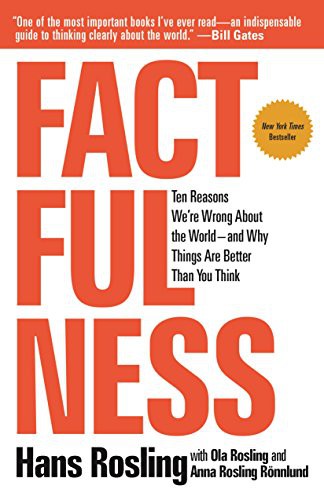Victor Villas reviewed Factfulness
Freakonomics for Humanitarians
3 stars
We need a more fact-based world view. You can probably find the 10 instincts and their respective solutions out there on the web and that greatly summarizes the good parts of the book. In a sense, this is the extrapolation of Thinking Fast and Slow applied to humanitarian progress. The bonus of reading the book instead of just looking up the list is getting showered with positive statistics about our progress in all kinds of important metrics regarding poverty, health, education and equality around the world. That was a healthy outcome and I appreciate the effects it had on me.
Still, for a book about resisting cognitive baits, every chapter will include a dozen. The author poses ill defined questions like "how many people have some access to electricity?", and of course the provided answers are set up in a way that you're blown away by the biggest number being …
We need a more fact-based world view. You can probably find the 10 instincts and their respective solutions out there on the web and that greatly summarizes the good parts of the book. In a sense, this is the extrapolation of Thinking Fast and Slow applied to humanitarian progress. The bonus of reading the book instead of just looking up the list is getting showered with positive statistics about our progress in all kinds of important metrics regarding poverty, health, education and equality around the world. That was a healthy outcome and I appreciate the effects it had on me.
Still, for a book about resisting cognitive baits, every chapter will include a dozen. The author poses ill defined questions like "how many people have some access to electricity?", and of course the provided answers are set up in a way that you're blown away by the biggest number being the answer. Isn't this a fault of the size instinct, and taking advantage of multiple-choice biases? How about designing the answers so there's an overly optimistic option as well? And how about defining precisely what "some access" means?
And the chapter on gaps, that was borderline disingenuous. We can't talk about pay gaps because the salary distributions overlap a lot? What kind of argument is that of "we can't think too much about the averages"? Almost every woman has a "salary twin" that makes just as much, but every woman has a "salary twin" that makes more as well. There are many ways to biject two distributions, so was the choice of the author based on factfulness?
After that argument about gaps the book would have to avoid discussing any aggregate statistic, but of course that "lesson" is forgotten as soon as it's convenient. The usage of CO2 per capita is highly praised to compare countries instead of total emissions, but shouldn't we look at histograms and continuous distributions only to avoid thinking of gaps? If two countries CO2 distributions have any overlap at all, we can't argue any meaningful comparisons!
And of course, the reason we discuss total emissions per country instead of per capita is because when global conferences occur, we have country representatives. That's the level of decision making and political power on the table, so that's the granularity of the metric most useful. Of course this skews the conversation towards populous countries, but that's intended because those are the countries where policies and incentives are more likely impactful due to scale. It's not because world leaders are ignorant or lack "factfulness", neither because they can't get some trivia questions right.
And the whole story about "us vs them" is very convincing, but only to the point where it's suddenly "us vs 3 of them". Separating the world in 4 slices instead of 2 is supposed to make us more united somehow?
Right out of the gate the author took the joy out of my reading experience, as this book was written in a way that leaks Freakonomics superiority complex. The author makes it very clear that they take pleasure in "gotcha"-ing people at best, publicly roasting students at worst if we take some anecdotes seriously. And there's this whole stereotype of being a rational person, not an optimist but a realist, facts over feelings and so on. Just stop it.

